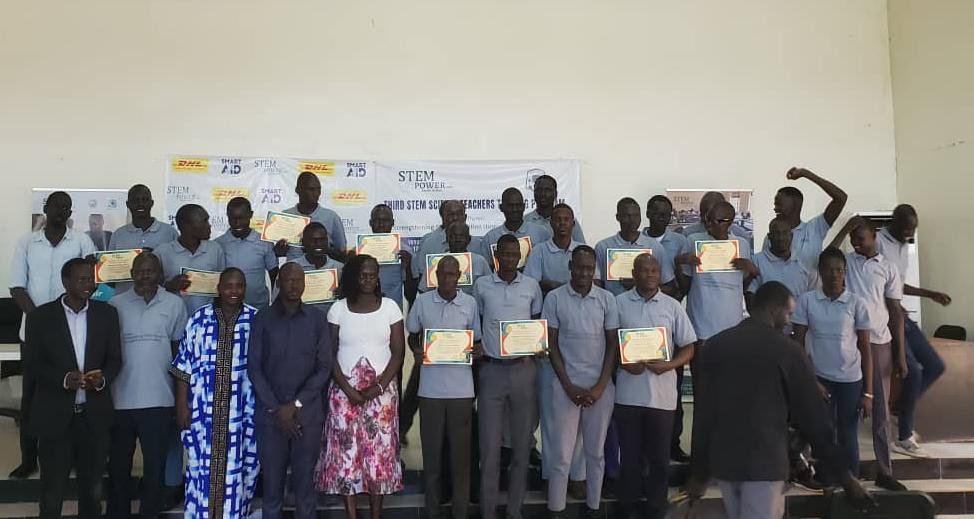Africa-Press – South-Sudan. STEMpower, a leading science and technology organization, has successfully concluded a 10-day laboratory training program for 22 public school teachers in Juba.
The initiative, themed “Strengthening STEM Education Through Teacher Training,” aimed to equip educators with practical skills in chemistry, biology, computer science, and electronics physics to improve the quality of science education in public schools and build the next generation of professionals.
It focused on equipping science teachers with practical laboratory skills in chemistry, biology, computer science, and electronics physics, which they will later pass on to students and youth at their respective STEM centres.
Speaking during the closing ceremony in Juba on Wednesday, August 27, 2025, Daniel Marial Kuol, Operations Manager for STEMpower South Sudan, said the initiative aims to empower public school teachers.
Marial stated that the program is designed to ensure government-employed teachers gain basic science skills to effectively use laboratory equipment and support students in their learning.
“This is the third teachers’ training program conducted by STEMpower South Sudan. Teacher training is one of our priorities as STEMpower South Sudan to ensure that the teachers who are assigned by the government of the Republic of South Sudan get at least the basic skills in these science subjects,” said Daniel.
“The equipment is there in the laboratories, so you can know what to do, or how to assist the students that come along, so that they all gain some knowledge.” He added, “Teachers were identified by the ministry, and the ministry is the one in charge of their welfare. Our main purpose was to take the equipment to any school that is identified, do the installation, set up the labs, and after doing everything, hand it over to the ministry.”
Engineer Richard Ring Kuach, Technical Manager, emphasized the intensity of the program, noting that teachers covered 60 credit hours of training over the 10 days. He urged participants to share the knowledge with colleagues and students.
“We technicians have invested a lot of effort to make sure you learn. So, we have covered most of the topics in the labs, and these labs include electronic physics, computer science, chemistry, and biology.
Six hours a day for 10 days—60 credit hours—it’s enough for you to have captured something. And when you go back, we expect you to deliver this knowledge to the teachers who are there and help our students understand the concept of science,” Richard said.
Meanwhile, Lucy Biel Nyang, Executive Director of STEMpower South Sudan, said STEM education is critical to the country’s future development. She described it as the backbone of producing world-class doctors, engineers, and other professionals.
“When we talk about STEM education, a lot of people tend to turn a blind eye to it. But STEM education is the backbone of our country’s development. This is the only way we will be able to give birth to world-class doctors, engineers, and all these different professionals. Without STEM education, these things cannot be done appropriately,” Lucy stated.
“As you have seen, South Sudan has been ranked very low when it comes to education, and we want to change that. We will not wait for our government. We are the ones to make that change. So please, when you go back to your STEM centers, ensure that all students are able to access these labs. Go to schools, inform them, and let them come and use the labs.”
Teachers who took part in the training also shared their experiences. Elizabeth Nysunday from Lakes State said the program will enable her to conduct practical lessons in chemistry and train fellow teachers.
Deng Daniel noted the importance of learning standard operating procedures, while Agout Bol, a biology lab technician, highlighted their work on plant and animal cells. In his part, Baucheng Makur Wel, an English and computer science teacher, said the knowledge gained will greatly benefit their communities.
“I have come here under the chemistry department to train on chemistry practicals. So, after the training, they are going to install a lab in the school. Then, we will be able to teach practicals,” said Makur.
“Students will be taken step by step so that they can learn. Whatever I learn here concerning the practicals can be taught to them.” He added, “Also, because I’m only one, I am in a position to help and train other teachers within the school premises or the neighboring schools on how to use a lab.”
“I learned a lot of things, including the introductory part of the practical, which is the introduction to the practical equipment and apparatus,” said Deng Daniel, who is representing the chemistry department.
“On the second day, I studied the standard operating procedures. Within the standard operating procedures, I learned that before I enter the lab, there are certain rules that I should first follow. And some of the rules include first putting on protective clothes, like a lab coat.”
“We’ve interacted a lot concerning the biology lab, where we tackled major areas that are very productive to teach,” said Agout Bol, a biology lab technician.
“We began with an introduction to the biology lab, what the biology lab looks like, and the arrangements of how the apparatus is to be placed in the lab. We also observed some plant and animal cells, whereby we extracted them to observe exactly how the onion cells look.”
“We have actually put everything into practice in the labs, and we have also learned computer science and IT at the University of Juba,” said Baucheng Makur Wel, an English and computer science teacher. “They have given us much knowledge, and we are going to actually put them into the community.”
For More News And Analysis About South-Sudan Follow Africa-Press






